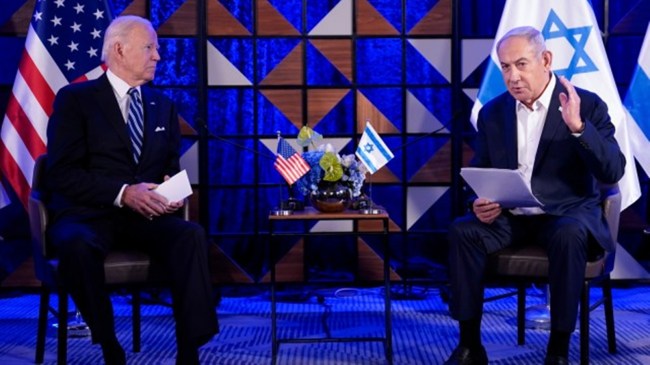Opinion Joe Biden’s Catch-22 – his support of Israel and dislike of Benjamin Netanyahu
Israel’s government wants to keep the army in Gaza for an infinite period while disallowing a political solution. Such a unilateral policy is not working well for the Biden Administration as it faces mounting criticism within America and abroad for giving Israel such massive leeway
 Joe Biden began to distance himself from Benjamin Netanyahu long before the Israel-Hamas war. (AP file)
Joe Biden began to distance himself from Benjamin Netanyahu long before the Israel-Hamas war. (AP file) US President Joe Biden is facing one of his toughest challenges with regard to the Israel-Hamas war — to persuade Israel’s prime minister, Benjamin Netanyahu, to find a political solution to the conflict.
Against the impending background of his re-match with Donald Trump, Biden may be worried that Hamas may not be willing to release the remaining hostages in return for a limited ceasefire — Netanyahu seems set on continuing the war and ignoring the principle of a two-state solution. Hamas has committed terrorism, while Netanyahu is fighting for political survival.
Biden began to distance himself from Netanyahu long before the Israel-Hamas war. During the year-long democratic movement against Netanyahu’s judicial “reforms”, Biden made no secret of the fact that he was with the protest movement and demanded that Israel retain an independent judiciary and democratic system. He also seems to take issue with Netanyahu’s far-right government’s desire to annex the West Bank rather than allow a future Palestinian state. He refused to invite Netanyahu to the White House to convey his dismay in 2023. The Hamas terror attack on civilians brought Biden to Israel, where he stood next to Netanyahu, and assured that the US would help Israel strategically and politically in the fight against Hamas. His solidarity moved Israelis, even though they knew he was against the current far-right government.
Israel has been fighting in Gaza for more than four months and yet, it is far away from its goal of destroying Hamas and capturing its leader Yahya Sinwar, the alleged mastermind of the October 7 attack or freeing the hostages from Gaza. Israel’s impulse to eliminate Hamas was unrealistic from the beginning. Yet, its abject failure to find hostages in Gaza’s tunnels has been surprising, given Israel’s all-out attack. Now, the Israeli army is staring at months, if not years, of fighting in Gaza. The humanitarian crisis has become a more daunting challenge — the Palestinians of Gaza do not have enough food, medicines and shelter. Israel wants to keep the army in Gaza for an infinite period while disallowing a political solution or an alternative governing body for the Palestinians. Such a unilateral policy is not working well for the Biden Administration as it faces mounting criticism within America and abroad for giving Israel such massive leeway.
Biden is offering a better plan that expects Israel to accept the two-state solution, in principle, with the Palestinians and, in return, get full diplomatic normalisation with Saudi Arabia as well as the support of the coalition of moderate Arab states like Egypt, Jordan, United Arab Emirates and Bahrain in rebuilding Gaza. The plan could be beneficial for Israel and Netanyahu personally because peace with Saudi Arabia will be the most important political achievement and prevent further deterioration of human life and dignity in Gaza. However, this “carrot diplomacy” has not worked. Netanyahu was quick to reject the Biden-Saudi peace plan last month. His cabinet passed a resolution stating that “Israel utterly rejects international diktats regarding a permanent settlement with the Palestinians… a settlement will come through direct negotiations between the parties without preconditions”.
Joe Biden is frustrated with Benjamin Netanyahu. In two different instances last month, Biden was reported to have privately expressed his dislike for Netanyahu, using thoroughly colourful language. The Biden administration also chose to express deep displeasure with a few policy changes. First, with an unprecedented executive order from Biden’s office, the US has started sanctions against Israeli settlers in the West Bank for intolerable violence against Palestinians. This had a strong impact as soon after, the United Kingdom and France also imposed sanctions against Israeli individuals in the occupied territories. Second, the Biden administration called settlements in the occupied territories illegal and inconsistent with international law, reversing the Trump-Pompeo policy under which settlements were turned kosher. Third, last week, the Biden administration invited Benny Gantz, a member of the current war cabinet but the emerging political alternative to Netanyahu, to the US undermining Netanyahu — an Israeli minister usually makes foreign visits with the permission of the Prime Minister but Gantz didn’t.
The carrot-and-stick diplomacy Joe Biden relies on needs time, but he does not have that, and neither do the people of Gaza who need immediate aid to survive. Biden’s love for Israel and distrust of Netanyahu have put him in a Catch-22.
The writer is associate professor and director, Jindal Centre for Israel Studies, Jindal School of International Affairs, O P Jindal Global University






